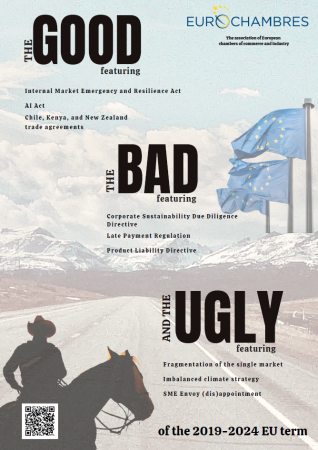The Bulgarian Chamber of Commerce and Industry joins the Association of the European Chambers of Commerce /Eurochambres/ in the analysis of the positive and negative legislative initiatives of the EU 2019-2024 term.
The publication “The Good, the Bad and the Ugly” reviews the 2019-2024 legislative term. Eurochambres President Vladimír Dlouhý has called for a much greater consideration of the needs of businesses by EU policy-makers throughout the next five-year mandate.
The chamber network’s analysis shows a mixed bag of positive and negative initiatives since 2019, as well as some worrying trends in relation to policy areas that are vital for Europe’s competitiveness.
Notwithstanding the multiple crises that characterised the 2019-2024 EU term, Eurochambres President Vladimír Dlouhý argues that policy-makers have too often overlooked the needs of entrepreneurs: “If we consider this review as a balance sheet, the EU is in deficit to the business community after the last five years. Too many legislative initiatives have been pursued that – individually or cumulatively - have a negative impact on the operations and results of our companies. That’s bad for Europe’s competitiveness, bad for jobs and bad for prosperity.”
The ‘good’ category features specific initiatives to tackle barriers within the single market, such as the Once-Only Technical System and the ongoing Head Office Tax System. A series of concluded free trade agreements are also welcomed, as are the Digital Markets Act and the AI Act, while chambers see positive economic aspects to the revived EU enlargement agenda.
Among the ‘bad’, Eurochambres highlights compliance and reporting burdens relating to the directives on Corporate Sustainability Due Diligence and Product Liability, restrictions on contractual freedom in the proposed Late Payment Regulation and a lack of progress on other important trade deals, such as those with Australia and Mercosur.
Worrying ‘ugly’ trends identified include the increasingly burdensome regulatory environment encountered by businesses, ongoing fragmentation of the single market and a lack of progress on the Capital Markets Union.
President Dlouhý added: “Our entrepreneurs have shown incredible resilience in recent years, but this cannot be taken for granted. If the encouraging political narrative on competitiveness is to be converted into tangible progress, the EU institutions must get the balance right between environmental, social and economic objectives. The EU cannot afford to be a world leader in regulating to the detriment of our economic growth.”
